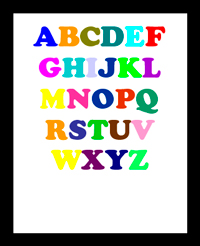Educational Psychology Service - Phonic Skills Activities
Developing Phonic Skills
Research clearly shows that there is a link between a young person’s phonological skills and their ability to learn to read as they progress through school. The development of good phonological skills is therefore very important aspect of any programme designed to support the development of effective reading skills.

Phonological skills encompass a range of skills including:
- The ability to recognise the sounds of individual letters
- The ability to link these sounds to the written form of the letter(s)
- The ability to listen to a word and hear the discrete sounds within the word
- The ability to blend together sounds in order to read words
The activities outlined below are designed to help develop a young person’s phonological awareness in a fun and informal way.
Some Activities
First to Five (2+ players)
Have word races. The object of the game could be slightly different each time.
For example: The first to name (or write or draw) five words that:
- begin with a certain letter
- rhyme with a certain word
- contain a certain sound (e.g. th, ow or sh)
- end with a certain letter
60 Second Challenge (1+ players)
You could use the same questions to have races of a different sort. This time see how many words you can name (or write or draw) in one minute.
You can have competitions or it can also be useful to work in a collaborative way (i.e. take turns to give an answer in the 60 seconds).
Categories (2+ players)
This is a version of an old favourite.
Present a word that follows a simple consonant, vowel, consonant pattern (e.g. cat, dog, pig, pit). There is then a race to see who can complete the following categories quickest.
Word = pig
- A word starting with the same letter (e.g. police)
- A real rhyming word (e.g. jig)
- A silly rhyming word (e.g. lig)
- Make a new word by changing the middle letter (e.g. peg)
- Make a new word by changing the end letter (e.g. pit)
The first person to finish shouts stop and everyone must stop. You get two points for each correct answer. If no-one is finished in two minutes, stop the game anyway and count the scores.
Play several rounds keeping a record of the scores.
The Nilly Same Game (1+ players)
Take famous people’s names and swap the initial sounds from their forename and their surname so Tony Blair would become Blony Tair (or Bony Tlair) and Kylie Minogue would become Mylie Kinogue.
Silly Rhymes (1+ players)
Take the first line of famous nursery rhymes and then work together to think of new ideas for the second line. If you wanted to you could draw pictures to illustrate the silly rhymes.
Humpty Dumpty sat on a wall
Humpty Dumpty kicked a big ball
Humpty Dumpty was really small
New Words (1+ players)
Take a simple three letter word which follow the consonant/vowel/ consonant pattern (e.g hot) and see how may new words you can make by changing just one letter in the word.
For example, if you change the “h” you could make “pot”, “lot”, “cot” etc
If you change the “o”, you could make “hit”, “hut” or “hat”
If you change the “t”, you could make “hop”, “hob”, “how” etc
This could also be a 60 second challenge.
Word Chains
Again, start with a word with a simple consonant / vowel / consonant pattern and make a chain of words by changing one letter at a time (e.g. pot > dot > dog > dig > fig > fit etc etc).
This game, again, would work well as 60 second challenges.
A slightly more complicated version of the game would be to start with a word, but as well as changing letters to make new words, letters could be also be added or taken away (e.g. bat > bath > baths > maths > mats > mits > miss)
Overcoming Reading Difficulties: Some Points
It is important to remember that there is no quick fix when it comes to overcoming reading difficulties. It should also be noted that even a well developed phonics programme, on its own, is unlikely to be sufficient in helping a child or young person make significant progress.
The best way for a young person to improve their reading is, simply, to read more. Reading more can be encouraged in a number of ways. Some ideas include reading together with a friend or a trusted adult, using audio tapes / CDs of stories alongside texts, using an incentive scheme (e.g. a sticker chart) to promote reading.
It is also important that readers understand that reading should primarily be about getting meaning from text. Too much emphasis on phonics means reading can be viewed by readers as a purely mechanical exercise rather than something that is interactive and fun.
Contact Us
Educational Psychology Service
Beechbrae Education Centre
Duffus Road
Elgin
01343 550999
